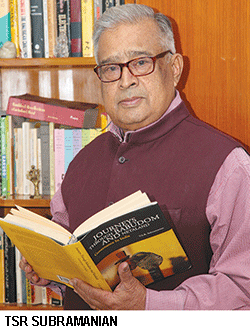 A recent newspaper report highlighting the intention of the state government of Delhi to take over management of 450 private schools for not refunding amounts charged by them in excess of the tuition fee permitted by the state government, gives rise to several policy questions. What are the pros and cons of private sector participation in schooling? Are private schools doing a much better job of education than government schools? What public-private participation models are possible and feasible?
A recent newspaper report highlighting the intention of the state government of Delhi to take over management of 450 private schools for not refunding amounts charged by them in excess of the tuition fee permitted by the state government, gives rise to several policy questions. What are the pros and cons of private sector participation in schooling? Are private schools doing a much better job of education than government schools? What public-private participation models are possible and feasible?
One extreme view is that in light of the proven incompetence of state governments in discharging the task of educating children, and implementing the Right of Children to Free & Compulsory (RTE) Act 2009, they should pull out of K-12 education entirely. The other view is that private schools whose managements tend to regard education as a business, and are exploitative, should not be allowed at all in this space. Most informed opinion falls between these extremes.
Let’s be clear: the fundamental issue in the school education system is quality. The Annual Status of Education Report (ASER) and several government reports have conclusively established that the quality of education dispensed to India’s children — especially in rural primaries — is abysmal. This is confirmed by several international reports including a recent (November 2016) study of the Pew Research Centre (USA) which describes the Indian school system as the worst in the world. It is now painfully apparent that India’s elementary (classes I-VIII) education system governed by the RTE Act which has pushed the GER (gross enrolment ratio) in primary education to 98.5 percent — while ensuring attendance — has been ineffective for 80 percent of India’s children; dropout rates are very high.
But is the problem only of government schools? An ASER study of a couple of years ago established with a fair degree of credibility, that there is no significant quality difference between private and government schools, if we take into account the differences in economic backgrounds — and home support — of students. In other words, the issue is one of economic disparity, rather than fundamental differences in teaching-learning standards.
Despite this, the aspiration of most parents is to enroll their children in private schools. Indeed many parents from low-income households make great sacrifices to give their children a ‘good education’ in private schools — most of which are expensive mirages in cost-benefit terms.
Several factors are behind this phenomenon — government has a poor reputation in implementation of any policy; more relevant, English of a sort is taught from the first classes in private schools, and most private schools offer early childhood pre-primary education which serves to encourage pre-schoolers to continue in the same school when they enter primary education. As a large number of authoritative studies — especially the research of Nobel laureate James Heckman — indicate, pre-primary, early childhood education is of vital importance. Therefore it is imperative that the RTE Act should be amended, to include preschooling for at least a couple of years.
Nevertheless the critical issue in primary-secondary education — government and private — is quality. Despite being highly politicised, K-12 education is a low priority of most state governments, primarily because children don’t vote! There’s little awareness that education cannot be administered like a tehsil or thana. Children have a natural instinct to learn. They need to be given the opportunity to learn in welcoming and pleasing environments.
Curiously within Indian society — perhaps even academia — there’s lack of awareness of the strong econometric correlation between high quality school education and national advancement and development. Indeed, worldwide, education is acknowledged as the cause and effect of development. Nearly every developed nation spends 7-10 percent of GDP on education, with most of it allocated to school education. Government-run public schools are an essential feature of their governance model. In the capitalist USA for example, nearly every child goes to a neighbouring free-of-charge government school.
Alas, in post-independence India we have not recognised the importance of high quality primary-secondary education as the pre-condition of economic development. Indeed, one can attribute India’s failure to emerge as a globally respected world power over the past 70 years, to poor education and inadequate provision — an average of 3.5 percent of GDP — for education. Yet, the prime focus of the HRD ministry at the Centre and education ministries in the states seems to be regulation of private schools rather than raising teaching-learning standards and learning outcomes of government schools. Unless the quality of education dispensed in the country’s 1.20 million government schools is sharply improved — and this requires not only higher budgetary provision by the Centre and state governments, but also significant reforms and new initiatives in public education in the states — the prospect of India emerging as a world power in the foreseeable future are dim.
(T.S.R. Subramanian is a former Union Cabinet secretary and chairman of the Committee for Evolution of the New Policy on Education 2016)























